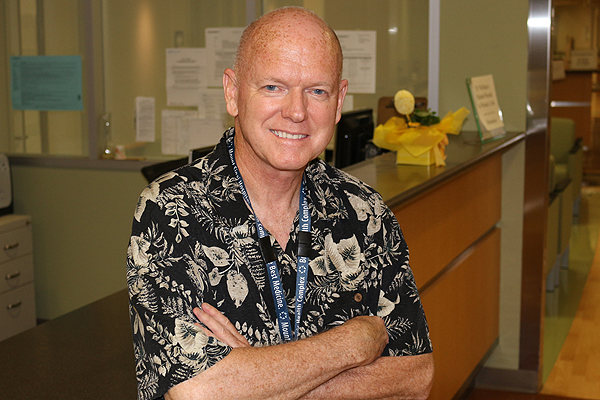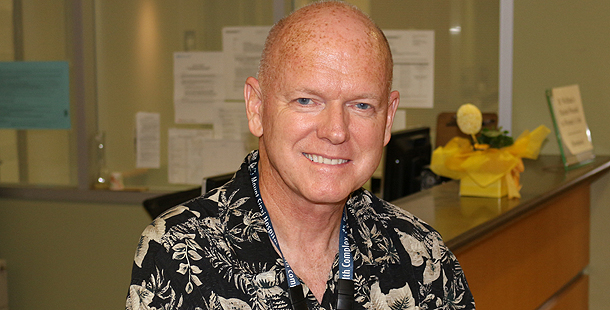Today’s fathers are becoming more involved in pregnancies

KEEPING DADS IN CHECK: Prenatal educator Patrick Mahoney helps calm the jitters of first-time fathers.
When it comes to prenatal education, Mount Sinai Hospital is thinking outside of the traditional gender stereotypes that have boxed in men and women.
Imagine, if you will, a soft-spoken man, who is a registered nurse for Toronto Public Health, addressing couples who are entering parenthood for the first time.
With the patience of a saint, prenatal educator Patrick Mahoney speaks to the anxieties of first-time fathers, and opens the lines of communication between husband and wife to better understand the roles they will play in the prenatal and postnatal stages.
Mahoney (pronounced “Manny”) teaches Mount Sinai’s prenatal and parent together class that runs for eight weeks on Tuesday and Wednesday nights.
“(The class) deals with prenatal ways and means for parents to work together so they can start to realize what’s happening between them and what’s happening with the baby,” he said, in a late-August interview. “There’s a lot of anxiety with dads, for sure, and we do address dad in the program … but the moms are anxious as well.”
North American statistics on the ever-changing family system Mahoney cites show a 35 percent increase in the last 25 years in fathers being more involved with their children at birth. In 2009, about 91 percent of fathers had experienced their children’s delivery.
It’s a big difference from 25 years ago, says Matthuschka Sheedy, prenatal education program coordinator at Mount Sinai and the woman who hired Mahoney a year ago.
“Some guys will say there’s an expectation that the father of the baby is going to be there, whereas it used to be they had to convince them they wanted to be there and, second of all, they had to get the hospitals to let them in,” she said.
Sheedy acknowledges a program was needed to alleviate some of the concerns fathers had during their partners’ pregnancies.
“The idea behind that was, instead of creating a class that was specifically geared to dads, research has indicated the way to involve dads is to try and get them involved, but keep the mom involved as well,” she said. “Otherwise, you don’t have the communication between the two.
“So, for example, if you’re trying to teach the guys how to change a diaper, you also need the mom there so she understands that he might do it differently than her. But then, that’s okay.”
Why is it important that fathers be involved with the pregnancy from the very beginning? Mahoney says it’s all about the hormones.
“The one thing that’s not really known is, when dads do this there’s a hormonal shift for the dad — when he gets involved with the baby care,” he said. “There are three or four hormones that kick in, that keep him more involved in the baby care and more involved with his partner.”
Oxytocin, prolactin and vasopressin are responsible for changes in fathers-to-be. They temper the testosterone.
And when dads get involved with pregnancy and the doctors’ appointments, oxytocin, which is the bonding hormone that’s circulating in the mom’s bloodstream, makes an appearance.
“What happens to the dad automatically, because he’s living with her, is oxytocin starts to surge through his bloodstram as well,” Mahoney says, interest rising in his voice. “Now, during the period of birth, and the dad’s getting involved with the birth, the oxytocin levels with mom are very high, and because it’s a bonding hormone, and the dad is there, the mom is very involved with the relationship.”
Any sort of confrontation is picked up on by the baby, even as young as three months old, Mahoney says.
To illustrate how baby might perceive disagreement, Mahoney describes a scenario in which dad and mom are playing with three-month-old baby on the couch.
“Let’s say mom believes she needs to be the supermom, or the gatekeeper, and she sort of has to make sure that the baby’s level of development is optimal,” he narrates. “She kind of takes over the play.
“Dad stays there, but he sort of withdraws, pushes away. He shuts it down a little bit. The baby picks this up from a feeling perception within a 10th of a second.”
In Mahoney’s illustration, baby looks at mom, looks at dad, and then looks at mom again, as if pleading: “Mom and Dad, make it safe for me, because it’s not safe for me.”
“If mom and dad pick up those cues, then they can actually support the baby in feeling safer,” Mahoney said. “It’s when we’re not working together as co-parents that we don’t have that opportunity to pick up the cues from the baby.”
It’s going to be a learning experience for new dad Matt Wilson. The Yonge-and-Bloor area resident was looking forward to the arrival of his son when the Town Crier caught up with him. The 34-year-old manager in the pharmaceuticals industry was in what he called “the male nesting stage”. Tristan would be born 11 days past his due date of Aug. 12.
“I would say it came out in a different way: I was going on house-improvement sprees,” he said, with a laugh. “I’ve been told it was a guynesting thing, where I would go into project after project.
“Basically, I would get home from work and go into work.”
Wilson agrees that husband-and-wife/father-and-mother should be on the same page. He share his sense of humour, on the topic.
“Fathers are mostly useless, pre-birth,” he chuckled. “There’s really absolutely nothing you can do except support your wife, and you’ll probably do that wrong as well.
“For me, I just focused on the stuff that I could do.”
The most stressful part of wife Gabrielle Johnson’s pregnancy for Wilson? Being past due.
“My sister said extra time is for extra cuteness,” he said, his grin evident over the phone.
An admitted worrier, he said he was most anxious when they went past the due date, because with people asking for updates “every second of the day” Gabrielle began to feel “quite pressured”, believing she should be doing something.
“I don’t mind if people are asking me all the time, but I get anxious when she gets anxious,” Wilson said. “The only thing to worry about is if your wife is worrying.”
Mahoney emphasizes a level playing field for first-time parents.
“Fathers are not mothers’ helpers,” he said. “Fathers are an integral part of the family system, and fathers have as much effect on the family system as the mothers.
“When new dads and moms go into the program, they go in on level playing field, because there’s a knowledge deficit for both of them. When people understand that, we can get away from this mother-centric idea that she is the only one who can do this job.”


Excellent article. My husband was hands on from the go. He was happy to use a midwife and researched the benefits over an OB. He attended the home birth information session and asked lots of questions and decided on the spot we would home birth. He was happy to participate in our Hypnobirthing classes and even assisted me with my meditations during labour. He acted as my Doula and did extensive research on circumcision so he could understand my reasoning against and ended up saying no to harming our boy. Today’s father is more hands on, more informed and more involved.